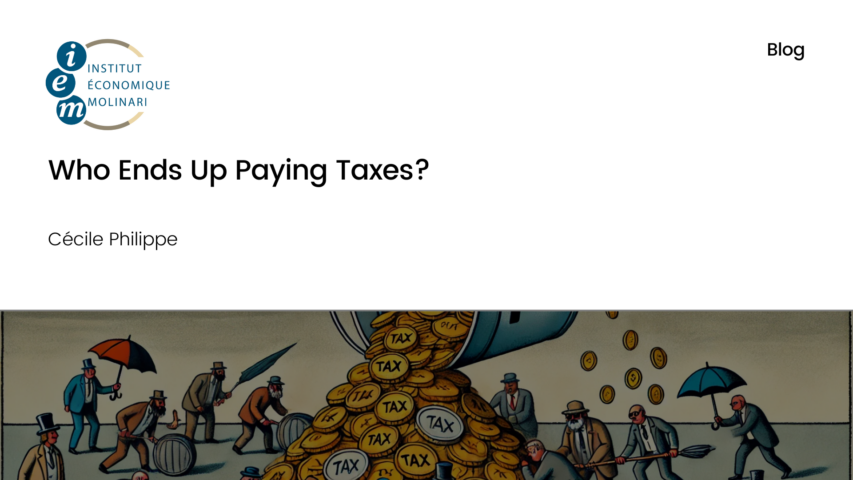Who Ends Up Paying Taxes?

Who Ends Up Paying Taxes?
Cécile Philippe // 28 April 2021
Tax shifts are widespread – often at the expense of the consumer – but governments do not always seem to be aware of the extent of such practice when they introduce new forms of taxation.
In times of crisis, it would be a mistake to use tax shifting without understanding its real effects. An analysis of its impact should be carried out in order to design effective public policies. However, it is clear that this approach to taxation does not reflect the complexities behind taxation, and thus remains superficial. Economists identified centuries ago that taxation was pervasive and passed from one actor to another. Whether it is a question of insurance, supplementary health services, taxing GAFA[1], or more generally production taxes, taxes keep on being multiplied ignoring that they are transferred to households.
Who pays what kinds of taxes? The answer often seems simple and depends on the legal status of taxes. Companies are supposed to pay the taxes specifically intended for them – employers’ contributions, profit taxes, etc. – just as households are supposed to pay the taxes designated for them – employees’ social security contributions, income tax, VAT, etc.
However, economic analysis shows that the reality is far from being so simple. In reality, households also bear the brunt of taxes that are not primarily aimed at them. In turn, they are de facto the actual taxpayers on products, production or corporate profits. Who actually pays taxes depends on the ability of actors to shift the tax burden to third parties.
The economists Adam Smith, David Ricardo, and Jean-Baptiste Say highlighted the role of the consumer in absorbing all kinds of taxes, depending on their ability to substitute products for others. Depending on the case, the tax impact also lies on individual employees and shareholders, and employees or shareholders within corporate structures.
Taxation hits the people who have the fewest alternatives, those who are economically least strong in society, in line with Maurice Lauré’s intuition that “the impact (of the tax shift) goes from the economically strong to the economically weak”.
Taxing GAFA – and generally production taxes – are emblematic of this impact. Google’s recent announcement to pass the tax on to its suppliers, who in turn pass it on to consumers, was predictable. Like Amazon and Apple, this digital giant is in a position to shift the taxes designated for it on European and French consumers.
Likewise, the billion euros levied on supplementary health insurance funds for their contribution to the health crisis has led to an increase in contributions in 2021. Not surprisingly, the tax is being passed on to the ‘socially insured’[2], and the private sector is not changing such practices which work in its benefit.
Taxes tend to penalise actors that were not the initially intended targets. To avoid this, we must learn to go beyond the legal constructs that Yuval Noah Harari rightly describes as “social fictions”. The challenge is also to look at the interactions between wealth creation and taxation, which is not a small task.
This article was originally published in French by Les Echos.
[1] GAFA refers to the big tech giants: Google, Amazon, Facebook, and Apple
[2] In France, a socially insured person is a person receiving benefits from a fund of the sickness branch of the Social Security system
EPICENTER publications and contributions from our member think tanks are designed to promote the discussion of economic issues and the role of markets in solving economic and social problems. As with all EPICENTER publications, the views expressed here are those of the author and not EPICENTER or its member think tanks (which have no corporate view).



